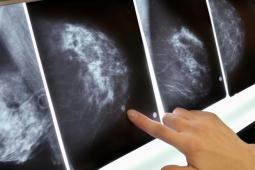ROLE OF RADIOLOGY IN DIAGNOSIS OF BREAST CANCER
Apr 19, 2022
Breast cancer is a global disease but of late, a rising trend has been seen in the Indian population. Even more concerning is the fact that it is now seen to occur in younger women. Therefore, it is imperative to diagnose it early, and this is possible by way of radiology investigations. The following are the ways in which radiology is changing the landscape of cancer detection.

71468969
Mammography: It is the investigation of choice for detection of breast cancer in asymptomatic women. It is advised that all women above the age of 40 years should have an annual mammography. There is a subset of a population like first degree relatives of breast cancer patients, who are more prone to breast cancer. This subset should have an annual mammogram after the age of 35 years. Mammography is a low dose set of X- rays of the breast which enable the Radiologist to detect early breast cancer.
Ultrasound of the breast: It is a very useful investigation and is the modality of choice for younger women. It is radiation free and also facilitates an FNAC/biopsy, if necessary. Breast ultrasound is very often combined with mammography for better characterization of the lesion.
MRI of the breast: In recent times, it has come up as a very useful investigation, which helps to differentiate between benign and malignant lesions. It is also useful when more than one lesion is suspected in one or both breasts. MRI is a radiation-free investigation. However, it is not a screening examination for the general population and is used in high-risk population or in cases suspicious for breast cancer.
PET CT: Another radiology investigation done for breast cancer patients is PET-CT. This test enables to detect the spread of breast cancer to other parts of the body. This is necessary for treatment planning.
Radiology Guided Biopsy or FNAC: In addition to imaging, Radiologist plays an important role in doing the biopsy or FNAC of a suspected lesion in the breast. This is usually done with the help of ultrasound and reduces the risk of false negative results.
In summary, radiology plays an important role in early detection of breast cancer. Early detection is very helpful in curing the patient.









